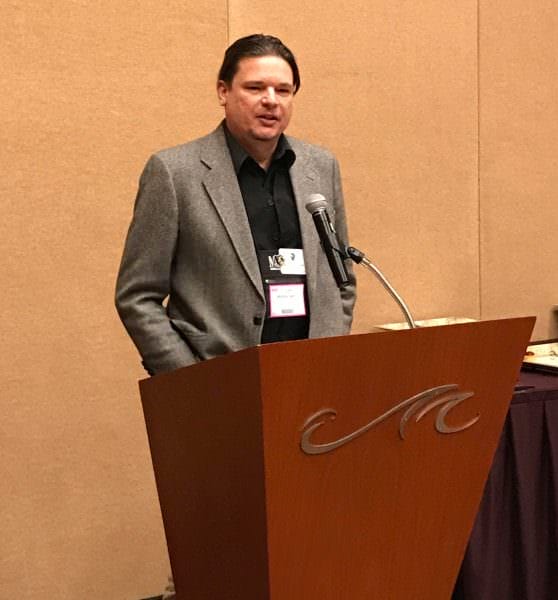By Joe Evans


USA -(Ammoland.com)- Matt Lewis, SCI Foundation Conservation Director, presented a lunchtime seminar at Safari Club International Conference 2017 in Las Vegas, Nev. to update patrons on SCI’s research, conservation efforts and to dispel myths surrounding African lion populations.
“The only people that love arguing more than scientist are lawyers.” Lewis said. “And my science is better than their science.”
Lewis rebuked the false idea that African lions are, as some conservation organizations would have people believe, going extinct.
To reinforce his point, Lewis cited the scientifically sound, reputable International Union of Conservation of Nature Red List. Unlike other lists or organizations, the Red List is not a regulatory list. It’s instead a rigorously science-based ranking of species by the best scientists in the industry.
The Red List currently lists African lions as vulnerable, a step below endangered and critically endangered.
Through his work with SCI Foundation, Lewis places the African lion population at an estimate between 18,000 to around 33,000 lions. Obviously, that’s an huge margin for error.
To get more precise, exact measurements on how many African lions are actually left, the SCI Foundation has launched studies and projects to learn how to better count and accurately document the African lion population.

This involved a comprehensive look at the accuracy of commonly used research methods for counting lions.
In Zimbabwe, for example, African lion populations were measured by driving a vehicle over the Serengeti and literally counting lion paw prints. The track counts would then be multiplied via kilometer.
Another method was to attract lions at night via mating calls, the sound of prey species and male lions roaring. The scientists involved would then count the lions they saw with the help of a flashlight to pick up the animals highly reflective eyes in the tall grass.
Obviously, both techniques were not as precise as scientists would like them to be, but they did help to decrease the margin of error in the lion population count dramatically. SCI Foundation wanted even more accurate numbers.
“If you out garbage data in, you get garbage data out.” Lewis said.
To combat that bad data, SCI Foundation launched the Tanzanian Lion Project in 2014 with the goal create a scientific model to consistently and, most importantly, accurately estimate the African lion population.
The study is ongoing in Serengeti National Park, Tanzania, the nation with Africa’s largest population of lions.

In addition to SCI Foundation’s work in Tanzania, Lewis cited an ongoing project to better determine the age of potentially harvested male lions.
Working alongside the The Zambia National Parks & Wildlife Service, the Lion Project compared dental X-rays and physical characteristics of aging lions in the wild to the dental and physical records of known-age male lions from Tanzania and South Africa to better judge the age of those wild lions.
The project has proven a technique that determines a lion age range within six months. This technique will better allow for trophy hunters to only harvest male lions that have aged out of their breeding years, drastically reducing the high cub mortality rates and pride splintering that come with killing an active male.
“Dominant males are vitally important.” Lewis said. “When it comes to harvesting, they absolutely must not be currently dominant males. That sort of thing is devastating to a pride.”
The science in the project will be used to more consistently age harvest appropriate lions and improve best practice for hunting operators.
To read more about SCI Foundation’s work, visit their website.
Becoming an SCI Member:
Joining Safari Club International is the best way to be an advocate for continuing our hunting heritage and supporting worldwide sustainable use conservation, wildlife education and humanitarian services. JOIN NOW: www.JoinSCI.org
Safari Club International – First For Hunters is the leader in protecting the freedom to hunt and in promoting wildlife conservation worldwide. SCI has approximately 200 Chapters worldwide and its members represent all 50 of the United States as well as 106 other countries. SCI’s proactive leadership in a host of cooperative wildlife conservation, outdoor education and humanitarian programs, with the SCI Foundation and other conservation groups, research institutions and government agencies, empowers sportsmen to be contributing community members and participants in sound wildlife management and conservation.
Visit the home page www.safariclub.org or call 520-620-1220 for more information.
About Joe Evans:
Joe Evans is the Assistant Editor at Ammoland.com.
The 22-year-old journalist, freelance writer and editor is a Pennsylvanian, a University of Scranton 2016 graduate. He’s a sports fan, blogger and lover of all things interesting. Forever writing something somewhere. Find him and read his work on Twitter and Ammoland.com.
